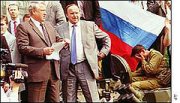
Russia
(MNN) — Former Russian president Boris Yeltsin, who played a key role in the
collapse of the Soviet Union and introduced free market democracy to Russia,
died from a heart attack Monday. He was 76.
The first freely-elected leader of Russia, Yeltsin
was known for his defiance of the monolithic Communist system. He was known for championing freedom of
speech and for manipulating the media.
Slavic Gospel Association's Joel Griffith says since he left
office in 1999, it seems much of his legacy was being undone. "Russia was
imposing more restrictions on the churches, cracking down on media freedom and
any political dissidents. Typically, the churches that we serve don't get
involved in politics. They try to avoid that and strictly focus on preaching
the Gospel. I think that attitude has
helped preserve a lot of the freedom they still retain."
Was he a friend to the church? Griffith
couldn't go so far as to affirm that. Yeltsin did usher in religious freedom but shared religious extremism (radical
Islam) concerns with other Commonwealth of Independent State presidents.
Late in his presidency, there was a religion law put
into place that did seem to impose more restrictions on churches. However, enforcement was lax under his
presidency.
Griffith
notes that because evangelical churches haven't had a lot of difficulty except
in isolated areas, oppression of church bodies doesn't appear to be a policy of
national government.
But with Yeltsin's influence fading, Griffith says there is some question as to
how long the current government will be friendly to ministries. "Will that change in the future? Who
knows? We're hoping and praying that it doesn't happen, but I believe the
churches are taking stock of that and trying to determine the approach they
will have in case crackdowns and further restrictions impose further
difficulties within the ministry."
